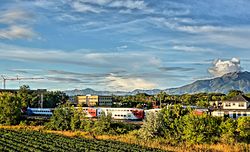Layton, Utah | |
|---|---|
 Historic Downtown Layton | |
 Location within Davis County and the State of Utah | |
| Coordinates: 41°04′18″N 111°59′49″W / 41.07167°N 111.99694°W | |
| Country | United States |
| State | Utah |
| County | Davis |
| Settled | 1850s |
| Incorporated | May 24, 1920 |
| City | 1950 |
| Named for | Christopher Layton |
| Government | |
| • Type | Council–manager[1] |
| Area | |
• Total | 22.65 sq mi (58.67 km2) |
| • Land | 22.50 sq mi (58.27 km2) |
| • Water | 0.16 sq mi (0.40 km2) |
| Elevation | 4,459 ft (1,359 m) |
| Population | |
• Total | 81,773 |
| • Density | 3,634.36/sq mi (1,403.35/km2) |
| Time zone | UTC−7 (Mountain (MST)) |
| • Summer (DST) | UTC−6 (MDT) |
| ZIP codes | 84040, 84041 |
| Area code(s) | 385, 801 |
| FIPS code | 49-43660[5] |
| GNIS feature ID | 2411639[3] |
| Website | laytoncity |
Layton (/ˈleɪʔɪn/) is a city in Davis County, Utah, United States. It is part of the Ogden-Clearfield Metropolitan Statistical Area. As of the 2020 census, the city had a population of 81,773,[4] with 2022 Census Bureau estimates showing an increase to 82,601.[6] 2024 estimates place Layton's population at 87,392. Layton is the most populous city in Davis County and the ninth most populous in Utah.
Layton has direct access to Salt Lake City, Ogden, Salt Lake City International Airport, Antelope Island, and the FrontRunner commuter rail. Layton City is a leader in economic development for the region, with immediate adjacency to Hill Air Force Base, a large hospitality district (1,000+ hotel beds) and conference center, the Layton Hills Mall, multiple nationally recognized retail and food chains, the East Gate Business Park, and the Weber State University-Davis campus.
In 2014, Layton contributed $1.34 billion[7] worth of retail sales activity, the second largest market north of Salt Lake City and seventh largest in Utah.
- ^ "Government". Layton City. Retrieved December 18, 2019.
- ^ "2019 U.S. Gazetteer Files". United States Census Bureau. Retrieved August 7, 2020.
- ^ a b U.S. Geological Survey Geographic Names Information System: Layton, Utah
- ^ a b "QuickFacts Layton city, Utah". United States Census Bureau. Retrieved January 2, 2022.
- ^ "U.S. Census website". United States Census Bureau. Retrieved January 31, 2008.
- ^ "City and Town Population Totals: 2020−2022". United States Census Bureau. Retrieved January 10, 2024.
- ^ "USTC - Calendar Year Taxable Sales". Archived from the original on June 25, 2015. Retrieved June 24, 2015.
